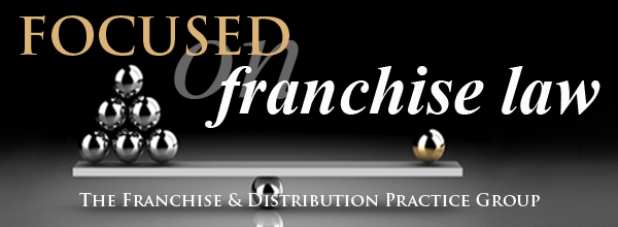Contractual Disclaimers & Distributor/Licensees as Franchisees

bkurtz@lewitthackman.com
dgurnick@lewitthackman.com
tgrinblat@lewitthackman.com
swolf@lewitthackman.com
msoroky@lewitthackman.com
kwallman@lewitthackman.com
tvernon@lewitthackman.com
</span
July 2015
Top Attorneys in Southern California
Barry Kurtz was recently recognized as one of Southern California’s Top Rated Lawyers by American Lawyer Media and Martindale-Hubbell. David Gurnick and Tal Grinblat were chosen among the nation’s “2015 Top Rated Lawyers in Intellectual Property” by the same organizations.
Most Trusted Advisors
Barry Kurtz and Tal Grinblat have been nominated for the San Fernando Valley Business Journal’s “Most Trusted Advisors” awards, which honor top professionals working in law, accounting, banking and insurance in Los Angeles’s San Fernando Valley. Area business leaders will select the finalists in these areas – award winners will be announced in August.
Barry Kurtz & Bryan Clements published in Valley Lawyer
“Too often, expansion minded business owners choose to offer trademarked products or services through purported licensing agreements or distribution or dealership arrangements only to discover well into the game, that what they have actually done is sell franchises…”
FRANCHISOR 101:
Contractual Disclaimers Save the Day

 A federal court in Florida has ruled that a disclaimer of representations contained in the franchise agreement between a childcare business franchisor and its franchisees barred claims against the franchisor for alleged pre-sale misrepresentations.
A federal court in Florida has ruled that a disclaimer of representations contained in the franchise agreement between a childcare business franchisor and its franchisees barred claims against the franchisor for alleged pre-sale misrepresentations.
The franchisees claimed they relied on oral and written misrepresentations about the required initial investment and other matters relating to their purchase of the franchise. They claimed the misrepresentations induced them to enter into their franchise agreements. The franchisor argued that the contractual disclaimer, stating in capital letters that the franchise agreement was the parties’ entire agreement, that there were no oral or written understandings outside the franchise agreement, and that the franchisees were not relying on representations outside the franchise agreement, prevented the franchisees from any action or recovery on these claims.
Some evidence supported the franchisees’ allegations. Still, the court ruled the agreement’s disclaimer of representations limited the potential claims to misrepresentations contained in the franchise agreement itself and that any claim of reliance by the franchisees on alleged misrepresentations outside the agreement was unreasonable. The court’s ruling was consistent with other court decisions on disclaimers of representations and reliance.
It is easy, after an agreement has been made, for someone to later claim there were additional promises outside the agreement. A disclaimer of representations provision in a franchise agreement or any agreement, is useful to thwart claims brought later, by franchisees or anyone. This type of disclaimer is included in most well drafted franchise documents. Many franchisors also require franchisees to answer and sign pre-sale questionnaires that confirm the franchise agreement is the entire agreement between the parties, that there are no oral or written understandings not included in the franchise agreement, and that the franchisee is not relying on any representations outside the franchise agreement.
Creative American Education v. The Learning Experience
FRANCHISEE 101:
Hawaiian Distributor May Be a Franchisee

A long-standing distributor and licensee of Harley-Davidson motorcycles in Hawaii was entitled to proceed on its claim that the business relationship with Harley-Davidson Motor Company, Inc. was a “franchise” under Hawaii’s Franchise Investment Law (HFIL), according to the decision of a federal court in Hawaii.
Cycle City was a distributor and dealer of Harley-Davidson products in Hawaii under various agreements since 1966. Cycle City was also a party to a license agreement with Harley-Davidson that let Cycle City manufacture and sell certain Harley-Davidson trademarked products. When Harley-Davidson declined to renew the agreements, Cycle City sued for breach of the agreements and violations of the HFIL.
Cycle City claimed the license agreement was a “franchise”, which is described in the HFIL as a business relationship under which (i) a license is granted to use a trade name, service mark, trademark, or logotype; (ii) the franchisee pays a “franchise fee” to the franchisor; and (iii) there exists a “community interest” between the franchisor and franchisee in the operation of the franchise business.
The HFIL defines a “franchise fee” as any fee or charge that a franchisee must pay or agrees to pay for the right to enter into or continue to operate a business under a franchise agreement and a “community interest” as a continuing financial interest between the franchisor and franchisee in the operation of the franchise business. Cycle City claimed the grant of the license to use the Harley-Davidson trademarks, a required annual minimum payment of $30,000 to Harley Davidson on the sale of licensed products, Cycle City’s substantial investment in the licensing venture and Harley-Davidson extensive controls over Cycle City’s sale of licensed products all combined to satisfy the three elements of a “franchise”.
The court agreed with Cycle City and noted there is “no precise line between when a company is simply a distributor or a manufacturer’s trademarked goods and when the company is a franchise. The mere licensing of a trademarked good, without more, does not give rise to a franchise relationship. How much more is required is a matter of degree and, in many cases such as this one, a question for the finder of fact.”
Cycle City, Ltd. v. Harley-Davidson Motor Co., Inc.
